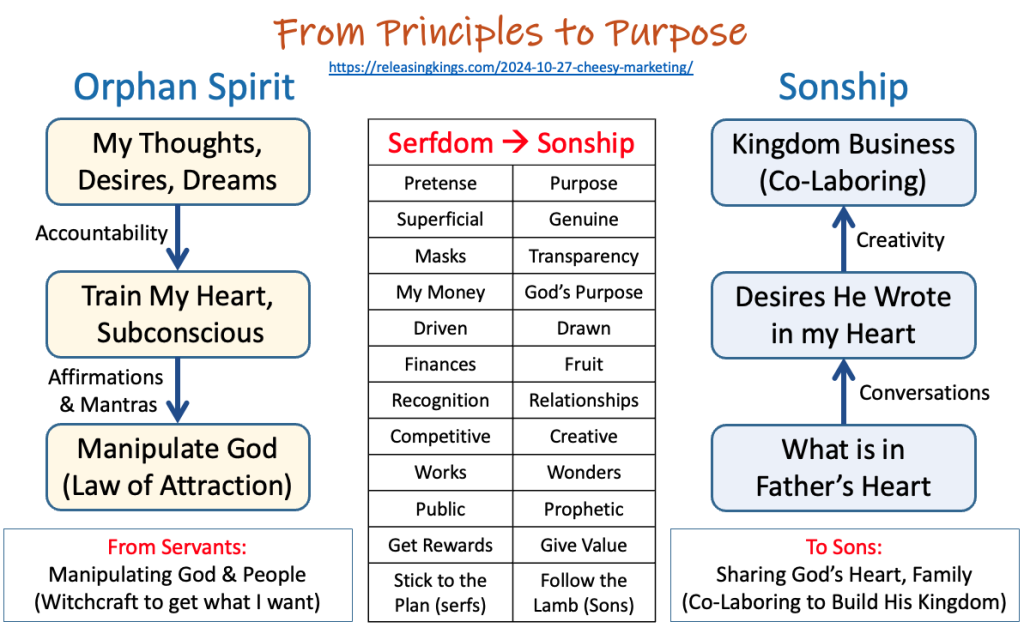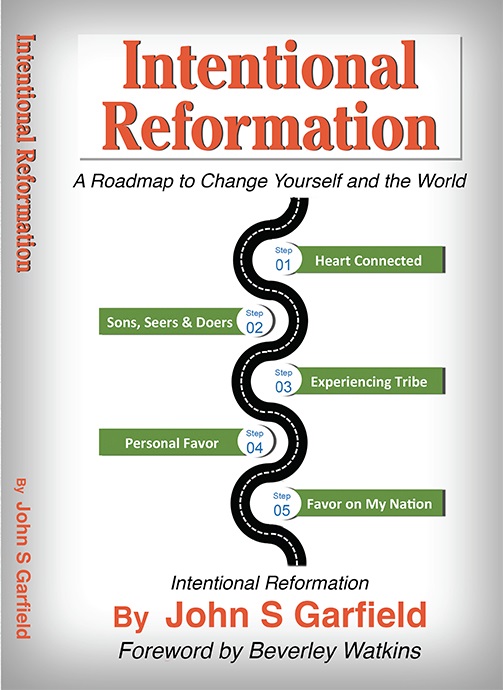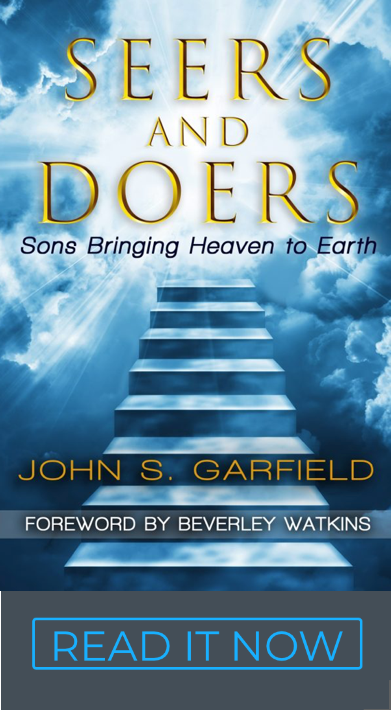Servant leader isn’t the goal. Jesus said it first to his disciples, I no longer call you servants (Jn 15:15).
The concept of servant leadership is a religious sacred cow whose time has expired. Moses was a servant in the Old Covenant, but Jesus was the firstborn of many sons in the new covenant (Heb 2:10-11, 3:1-6, Rom 8:29). Kingdom Business is about sons bringing Heaven to Earth in a Reformation of Nations… because that’s what Father is doing.
Servant leadership is a mask for spiritual control.
Servants come from a paradigm that god is sovereign; in control, that he is controlling by nature. We all tend to become like the god we serve (Ps 115:2-8), for better or for worse. Servants naturally take on the controlling attributes of their conception of god. It has a self-righteous tone in it!
- Servants work very hard to control their circumstances.
- They call it stewardship – and make their plans with religious fervor.
- They work hard to control other people and become authoritarian on the way.
- They call it discipleship – and do it with evangelistic fervor.
- They call it god’s principles, rules, values… the letter without the Spirit!
Servant leaders believe it’s their job to help you become a good servant too.
There are clear expectations for servant employees. Servant leaders are the enforcement class of the leadership hierarchy. Servant is a misnomer because they aren’t really serving you. Their allegiance is for the corporate expectation and their enforcement taser is shame, you’re not living up to god’s expectations and we must hold you accountable. The level of control can approach a level of religious witchcraft that casts a spell of deception on the droids to imprison them in the sectarian captivity of their corporate clique. Our way is god’s way!
Have you felt the coercion of peer pressure to join the servanthood club?
Servant leaders never operate alone. They have a tribe of ladder-climbing peers equally schooled in the corporate dogma. Favoritism is palpable for the good droids and exclusion is reserved for the slow learners whose semi-compliant lip service doesn’t make the cut.
Have you felt the jailbreak of aligning with the purpose God wrote in your heart?
There exists a place of awakening that can rescue you from becoming a servant leader in a sect. This place is the experience of sonship—the profound connection you make with the purpose that God has written in your heart and the irresistible invitation from the Holy Spirit to embrace it. Unfortunately, servant leadership has become the current religious counterfeit for sonship and the Council. The transition from servanthood to sonship feels like a jailbreak:
#1). I become my genuine self and don’t have to put on the religious act or wear the fig leaves. Becoming His son or daughter is very liberating!
#2). As a son, I am given my Father’s Power, Authority, Anointing, and Love for people. I create a totally different impression and first impression. It’s not controlling, I’m adding value!
#3). Father co-labors with me and my business. He really does add all these things when I put His Kingdom and His righteousness first (Mt 6:33). My Father and I are on the same page. I’m flowing with purpose that is much bigger than “me” – a higher cause is the root of my passion instead of personal prosperity. It flows from my Father and I’m flowing with it.
#4). I’m off the serfish treadmill of discipline and accountability. As a son I see and share Father’s heart. I’m passionate and pre-wired to co-labor with Him. Intrinsic motivation is internal not external. The goal is sonship, not servanthood.
#5. There is an Ecclesia in my tribe that is built around shared purpose, knowing what God wrote in one another’s hearts, all of us putting His Kingdom first. People are drawn to the freedom that Jesus redeemed for us, the revelation of my sonship, someone who has the conversations and carries his Father’s purpose.
You have to be a son to birth one!
When I first gave myself permission to get off the hamster wheel of servanthood and become a son, it was like getting saved again. I began to discern the desires Father wrote in my heart. It was an adventure.
The first surprise was that my eyes were opened to see the desires God wrote in the hearts of other droids and set them free. Seeing your own heart takes the blinders off to see others. It first happened in business conferences in Poland in 2011.
The second surprise was how grateful those Polish people were when we prophetically “saw” their hearts and helped them into their Kingdom purpose. They loved me for respecting them! I had not anticipated this depth of relationship. Once Kingdom purpose in hearts is unveiled, the level of mutual respect and love is supernatural and enduring. We have friends for life.
Third surprise – CEOs and leaders in Business have the same response and results. We’re still pulling the curtain back on the Kingdom purpose Father wrote in the hearts of His sons. Check out Our Offers for your jailbreak.

This blog was inspired by my own Council session. Take a look for more.
Q&A to Relieve Theological Heartburn
Rom 8:19 – For the creation waits with eager longing for the revealing of the sons of God.
29 – For those God foreknew he also predestined to be conformed to the image of his Son,
that he might be the firstborn among many brothers and sisters.
Heb 2:10 – In bringing many sons and daughters to glory,
it was fitting that God, for whom and through whom everything exists,
should make the pioneer of their salvation perfect through what he suffered.
11) Both the one who makes people holy and those who are made holy are of the same family.
So Jesus is not ashamed to call them brothers and sisters.
Heb 3:5 – “Moses was faithful as a servant in all God’s house,”
bearing witness to what would be spoken by God in the future.
6) But Christ is faithful as the Son over God’s house.
And we are his house, if indeed we hold firmly to our confidence and the hope in which we glory.
Q&A – the Master in the parable of the talents says in Mt 25:21, Well done good and faithful servant?
(Doulos means slave, G1401) Note that it’s a parable for the Jews, not the voice of God. When God really did speak at Jesus’ baptism He said, This is my beloved son. The New Testament was a bridge for the Jews from the Old Testament to the New. Jesus and the authors were not totally free to talk about sonship without losing their religious audience or getting stoned. They used terms like sheep, servant, and slave to introduce sonship. Servant leadership is a modern religious substitute/counterfeit for sonship and the Council.
Jn 5:18 – For this reason they tried all the more to kill him; not only was he breaking the Sabbath,
but he was even calling God his own Father, making himself equal with God.
Jn 1:51 – I prophesy to you eternal truth: From now on you will see an open heaven
and gaze upon the Son of Man like a stairway reaching into the sky
with the messengers of God (sons) climbing up and down upon him! (TPT)
Q – Is what you are saying is that for the Jews sonship with God wasn’t a thing until Jesus went to heaven?
- Jesus did redeem our access to Father via ascension (Jn 1:51). I’m not clear exactly when that started, but the choices are in Acts or 70AD. See Sonship & the Divine Council for more.
- The Jews couldn’t receive the concept of sonship, so there was a political and practical complication in sharing it. The first order of business was getting them saved.
- I think this blog is helpful, but even in our day it will challenge some mindsets. You can feel progress in Kingdom Business. You can also feel the Lord confronting a religious spirit and moving us into the next phase (sonship).
Q – At what time in the new testament do sons and sonship appear/show up?
Based on Heb 9:8 and the verses below, it seems safe to suggest the way into the Council opened after the destruction of the temple in AD70.
- Jn 14:6 – I am the way and the truth and the life. No one comes to the Father except through me.
- Jn 10:9 – I am the gate; whoever enters through me will be saved.
They will come in and go out, and find pasture. (Ascend and Descend, Jn 1:51) - Jn 1:51 – I prophesy to you eternal truth: From now on you will see an open heaven
and gaze upon the Son of Man like a stairway reaching into the sky
with the messengers of God climbing up and down upon him! - Jn 14:2-4 – You know the way to the place where I am going.
- Heb 10:19 – Therefore, brothers and sisters, since
we have confidence to enter the Most Holy Place by the blood of Jesus,
20) by a new and living way opened for us through the curtain, that is, his body, - Heb 9:8 – The Holy Spirit was showing by this that the way into the Most Holy Place
had not yet been disclosed as long as the first tabernacle was still functioning. (AD70)
Q – It appears that sonship doesn’t come into play until one becomes a believer in Christ.
- Agree
Q – How should we update our language and our definitions of servant leadership?
(Current) Servant Leader – We prioritize serving the needs of others
and empowering them to reach their fullest potential.
(Update) Sonship Culture (I personally prefer this tag coupled with the 4th suggestion)
1) We prioritize connecting people with their unique purpose
and empowering them to reach their fullest potential.
2) We prioritize connecting people with their Kingdom purpose
and empowering them to reach their fullest potential.
3) We prioritize fathering people into their Kingdom purpose
and empowering them to reach their fullest potential.
4) We develop leaders who father people into their Kingdom purpose
and empower them to manifest their dream with us.
Q – Aren’t we at times all of these: sheep, servants and sons. Just as God possesses more than one identity or character trait, we do as well in particular seasons and situations?
- Sons can be obedient, but they don’t take on the identity of a slave. God isn’t “controlling.”
- #2 He just doesn’t treat sons like sheep.
- We could water this down; it’s just semantics with no point to be made… but we’re not going to.
Q – How does the Servant/Son Paradigm affect hearing God for practical business Planning and Management?
Sons ascending to God’s Courts and Council is revolutionary with respect to prayer. They pick up on what’s in Father’s heart and have conversations around purpose and strategy with the 7 Spirits. Servants are stuck on the traditional prayer model which submits a laundry list of their needs drawn from their dreams. They are prone to miss Father’s purpose and maintain an introverted focus on life and business. The two main distinctions are:
Servants waive the flag for being God’s stewards, but their plans are self-generated and self-centered. The love the realm of Kingdom principles, values, rules, roles, verses… they love to preach the letter and miss the spirit. Servants naturally focus on aspects of the business process and planning they can manage independently, usually in the absence of clarity on Father’s purpose.
Sons come from a perspective of seeing and hearing God’s purpose. Plans and process flow naturally from Father’s purpose to bear fruit around that dynamic direction. They expect mid-course corrections and put more value on following the lamb (Rev 14:4) and discerning the wind (Jn 3:8) than on defending their plans and process. They live in tents more than temples. They live and move and have their identity in the Council as their Father’s offspring, sons, and family (Acts 17:28). They make room for what God can do in their business (Ps 24:7) and they intentionally co-labor with Him to add all these things (Mt 6:33).
In summary, their plan is to be Jesus followers via routine conversations in the Council. There is a living, prophetic ring in their initiatives that draw contributors who want to share Father’s purpose, Ecclesia. Their plan is their Father’s plan, and they grasp ascension, bringing heaven to earth, and Reformation of Nations. A Son’s highest value isn’t their vision and their plan to reach it. It’s co-laboring with Father and being current with His vision; conversations in God’s Council with the 7 Spirits around purpose, strategy, tactics, etc. Conversations in the Council is the key that unlocks identity, creativity, initiative, and a Business Culture built around shared Kingdom purpose. The definition of righteousness is being on the same page with Father because of those conversations. See expanded Graphic – 7 Spirit Assessment.

We also had a great Face Book live disucussion on this topic.


